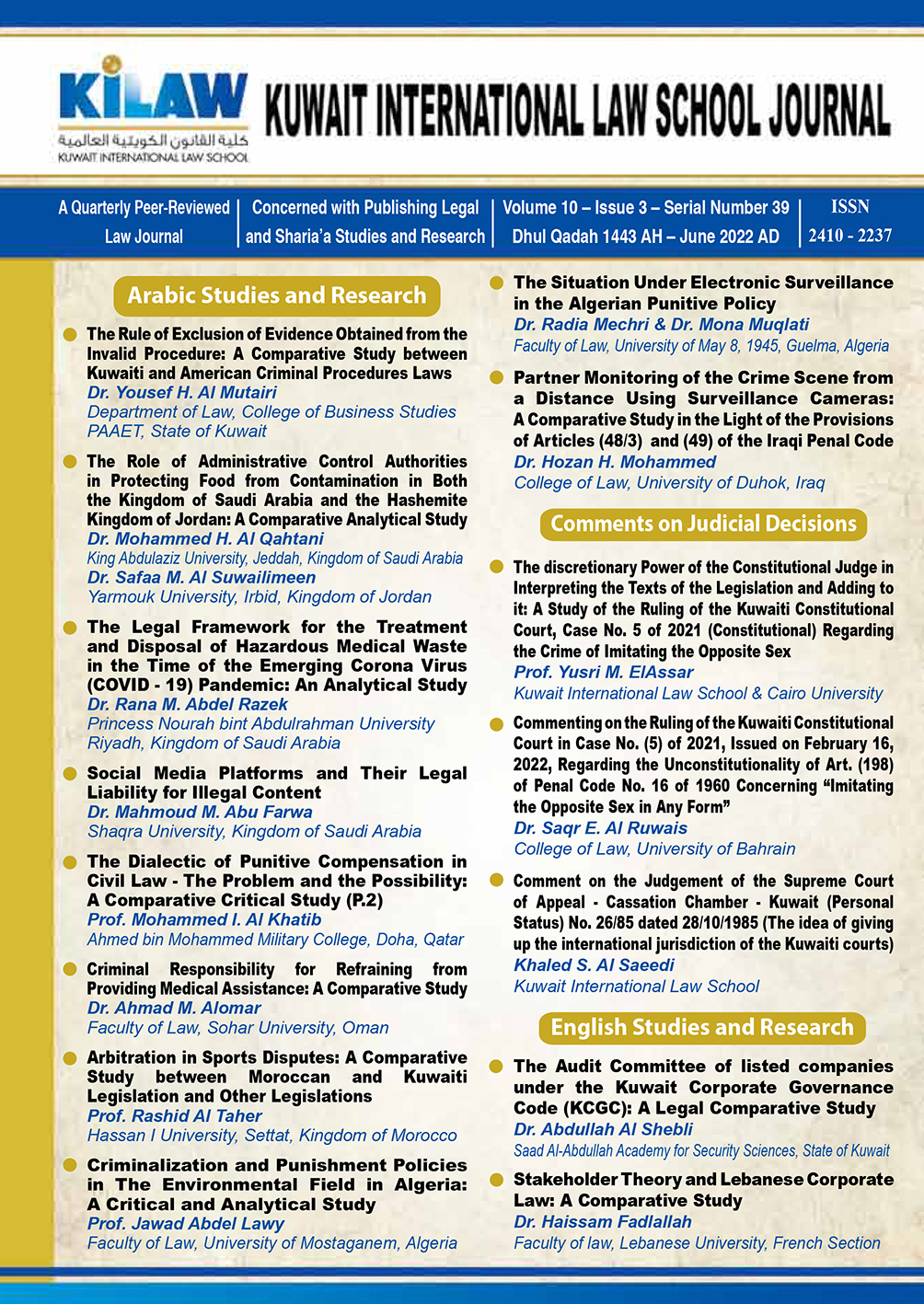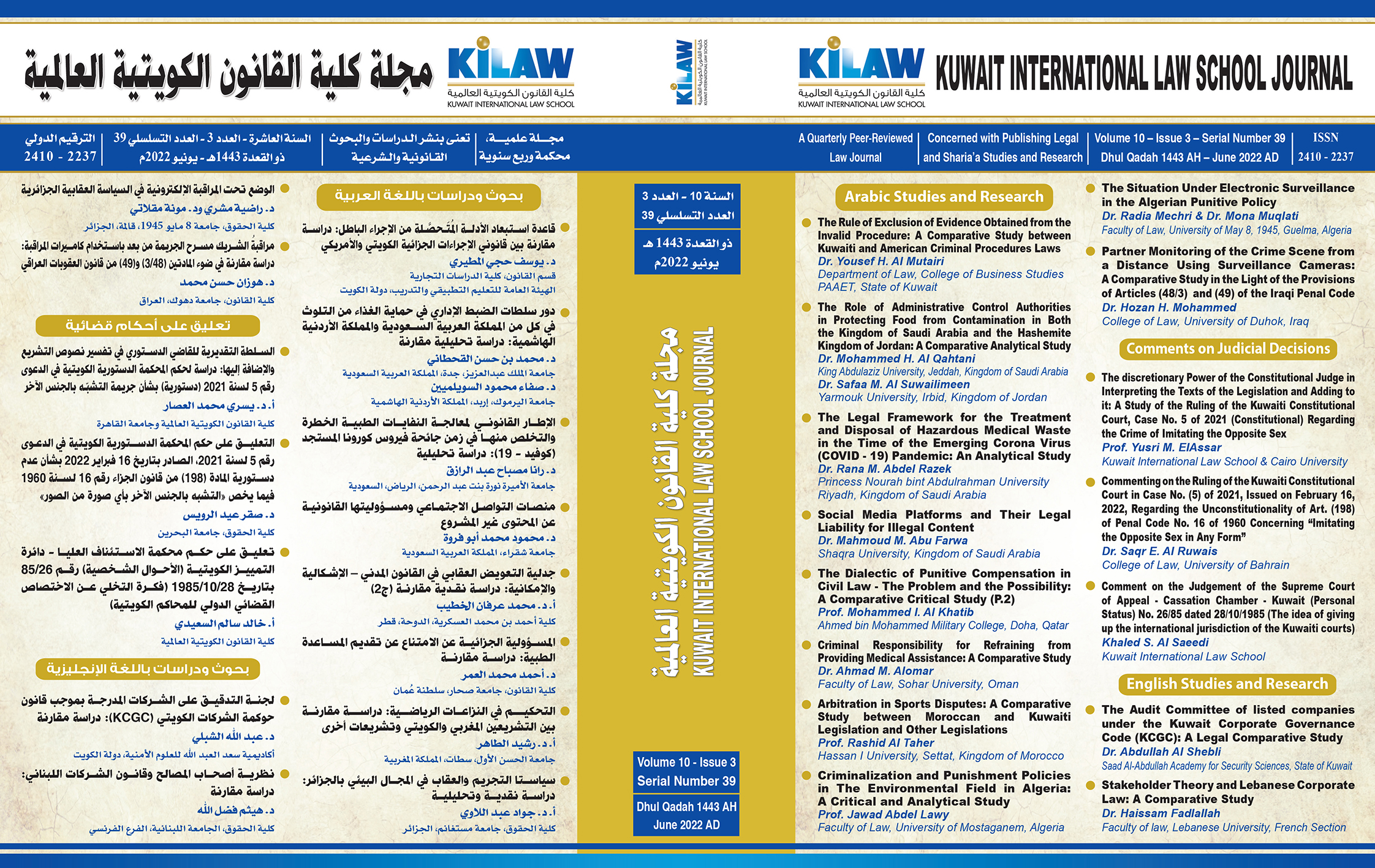| Volume 10 |
Dhul Qadah 1443 |
| Issue 3 |
June 2022 |
| ISSN 24102237 |

Editorial
A New Arab Legal Declaration to Combat
all Forms of Violence against Women
By: Prof. Badria A. Al-Awadi
Editor-in-Chief
In an official collective Arab human rights initiative, the League of Arab States endorsed a new declaration to protect women and girls from all forms of violence. This declaration is important because it coincides with the increase in the frequency of crimes of violence against women in a number of Arab countries, and the rise of human rights and social voices calling for the adoption of practical and effective measures to address these crimes which have turned into a phenomenon covered with false justifications that cannot be accepted.
This declaration came during the meetings of the 49th session of the Permanent Arab Committee for Human Rights held at the headquarters of the Arab League in Cairo, on February 22, 2022.
Legal Stability and the Problems of Preparing and Drafting Legislations and Laws
Chief-in-Editor Prof. Badria A. Al-Awadi
In an official collective Arab human rights initiative, the League of Arab States endorsed a new declaration to protect women and girls from all forms of violence. This declaration is important because it coincides with the increase in the frequency of crimes of violence against women in a number of Arab countries, and the rise of human rights and social voices calling for the adoption of practical and effective measures to address these crimes which have turned into a phenomenon covered with false justifications that cannot be accepted.
This declaration came during the meetings of the 49th session of the Permanent Arab Committee for Human Rights held at the headquarters of the Arab League in Cairo, on February 22, 2022. The declaration included a preface and eleven articles, in which its authors affirmed – in its preface – the recognition of “the central position of women in society, and their being on the same level with men in honoring, in light of the fairness approved by Islamic law and other divine laws, and the legislation and covenants in force in favor of women. He also stressed that “all persons are equal before the law, and that every person has the right to live a dignified and safe life free of violence.”
The declaration recorded the seriousness of the phenomenon of violence against women and girls, and the resulting health, psychological, social and security damages, including violence under occupation, armed conflicts, organized and transnational crime networks, and terrorism. Then, it concluded that there is an urgent need to adopt procedures and mechanisms capable of eliminating violence against women and girls, preventing it, and addressing it, with political and societal will, and an explicit legal commitment.
In Article (1), the declaration defines violence against women and girls as: “All acts of violence at the family and community levels that may cause material or moral harm to women and girls alike, including physical, sexual and psychological violence, or threats to do so.” With such acts, coercion, or arbitrary deprivation of rights and freedoms. This violence includes – but is not limited to – family, domestic, community and digital violence. What is noted is that this definition is broad, comprehensive, takes into account recent developments, and includes a great deal of accuracy, which helps in the legal and administrative response to these acts by adopting proactive, immediate and proactive actions.
Article (2) states that this declaration “is a commitment by Arab countries to protect women and girls from all forms of violence, and to strengthen efforts to eliminate all forms of discrimination against them.” Article (3) called on member states to “work to bolster legislative measures and legal procedures to protect women and girls, ensure their access to justice in the event of any violence, and ensure that perpetrators of violent crimes against them do not go unpunished.” This is an explicit call to strengthen the legal and legislative basis for enacting deterrent laws and measures.
Article (4) of the Declaration affirmed the need for Member States “to commit themselves to adopting and strengthening policies of equality between women and men, and to develop effective and comprehensive national programmes and plans of action to empower and protect women, especially during emergencies and armed conflicts and their consequences, whilst working to include measures to combat violence against women and girls in national development policies.”
In terms of practical and remedial measures, Article (7) of the declaration stipulates “the importance of providing health, psychological and social support and legal assistance to women and girls who are victims of violence, and establishing and supporting shelters, care and rehabilitation centers specialized in this field for victims and helping them to be integrated into society.” This matter covers the stage which follows exposure to any assault or violence, and it is a matter that responds to the international standards stipulated in this field.
On the preventive side, the authors of the declaration stressed in Article (8) the importance of raising awareness, through educational programmes and curricula at all levels of education, of the rights of women and girls and their place in society in accordance with human rights principles, in a way that establishes the values and culture of tolerance and mutual respect. There is no doubt that these measures are important, and they must be transformed into continuous programmes to ensure their positive impact on women’s safety and security, their access to all their rights, and their pioneering social and developmental roles.
Many argue – rightly – that human rights declarations lack the legal value, which is necessary for states and bodies, but they are – without a doubt – an international and regional framework, and a call for practical and tangible measures, under the penalty of sanctions and reprimands in regional and international organizations.
Honoring women is part of honoring human beings demanded by God Almighty in his noble book by saying: “Indeed, We have dignified the children of Adam, carried them on land and sea, granted them good and lawful provisions, and privileged them far above many of Our creatures.” Moreover, our Holy Prophet recommended it in many hadiths, including: “Treat women kindly…”. Therefore, Arab and Islamic societies are invited – more than others – to respect women and empower them with all their rights, and to strengthen their role; because this finds its basis in their religion and law, and in their constitutions and laws, as well as in the agreements and laws of the world in which they live, and with whom women live, along with the values and principles of justice, equality, solidarity, and interdependence. These communities are also called upon by constitutional authorities and governing administrative and executive bodies and institutions, to enact all necessary laws and take all firm measures and necessary steps to prevent all types of violence against women, within the framework of social unity and solidarity among the various groups of society.
Content
Arabic Studies and Research
The Rule of Exclusion of Evidence Obtained from the Invalid Procedure: A Comparative Study between Kuwaiti and American Criminal Procedures Laws
Dr. Yousef Haji Mutairi
Associate Professor of Criminal Law
Department of Law, College of Business Studies
Public Authority for Applied Education and Training
State of Kuwait
The Role of Administrative Control Authorities in Protecting Food from Contamination in Both the Kingdom of Saudi Arabia and the Hashemite Kingdom of Jordan: A Comparative Analytical Study
Dr. Mohammed bin Hassan Al Qahtani
Associate Professor of Administrative
and Constitutional Law
Faculty of Law, King Abdulaziz University
Jeddah, Kingdom of Saudi Arabia
Dr. Safaa Mahmoud Al Suwailimeen
Associate Professor of Administrative Law
Faculty of Law, Yarmouk University
Irbid, Kingdom of Jordan
The Legal Framework for the Treatment and Disposal of Hazardous Medical Waste in the Time of the Emerging Corona Virus (COVID – 19) Pandemic: An Analytical Study
Dr. Rana Mesbah Abdel Razek
Assistant Professor of Criminal Law
Department of Law, Deanship of Community
Service and Continuing Education
Princess Nourah bint Abdulrahman University
Riyadh, KSA
Social Media Platforms and Their Legal Liability for Illegal Content
Dr. Mahmoud Mohammed Abu Farwa
Assistant Professor of Civil Law
Department of Law, College of Science and Humanities
Huraymila, Shaqra University, Kingdom of Saudi Arabia
The Dialectic of Punitive Compensation in Civil Law The Problem and the Possibility: A Comparative Critical Study of Philosophy and Rooting between the Anglo-Saxon and Latin Schools
Prof. Muhammad Irfan Al Khatib
Professor of Civil Law
Ahmed bin Mohammed Military College
Doha, Qatar
Criminal Responsibility for Refraining from Providing Medical Assistance: A Comparative Study
Dr. Ahmad Mohamad Alomar
Assistant Professor of Criminal Law
Faculty of Law, Sohar University, Oman
Arbitration in Sports Disputes: A Comparative Study between Moroccan and Kuwaiti Legislation and Other Legislations
Prof. Rashid Al Taher
Professor of Business Law
Research Lab of Business Law
Hassan I University, Settat City, Kingdom of Morocco
Criminalization and Punishment Policies in The Environmental Field in Algeria: Critical and Analytical Study
Prof. Jawad Abdel Lawy
Professor of Higher Education
Faculty of Law and Political Sciences
University of Mostaganem, Algeria
The Situation Under Electronic Surveillance in the Algerian Punitive Policy
Dr. Radia Mechri
Associate Professor of Criminal Law
Faculty of Law and Political Sciences, University of May 8, 1945, Guelma, Algeria
Associate Professor of Criminal Law
Faculty of Law and Political Sciences, University of May 8, 1945, Guelma, Algeria
Partner Monitoring of the Crime Scene from a Distance Using Surveillance Cameras: A Comparative Study in the Light of the Provisions of Articles (48/3) and (49) of the Iraqi Penal Code
Dr. Hozan Hassan Mohammed
Criminal law Lecturer
College of Law, University of Duhok, Iraq
The discretionary Power of the Constitutional Judge in Interpreting the Texts of the Legislation and Adding to it: A Study of the Ruling of the Kuwaiti Constitutional Court, Case No. 5 of 2021 (Constitutional) Regarding the Crime of Imitating the Opposite Sex
Prof. Yusri Mohammed ElAssar
Professor of Public Law
Kuwait International Law School and Cairo University
Commenting on the Ruling of the Kuwaiti Constitutional Court in Case No. 5 of 2021, Regarding the Unconstitutionality of Art. (198) of Penal Code No. 16 of 1960 Concerning “Imitating the Opposite Sex in Any Form
Dr. Saqr Eid Al Ruwais
Associate Professor of Public Law
College of Law, University of Bahrain
Comment on the Judgement of the Supreme Court of Appeal Cassation Chamber – Kuwait (Personal Status) No. 26/85 (The idea of giving up the international jurisdiction of the Kuwaiti courts)
Khaled Salem Al Saeedi
Supporting Faculty Member
Kuwait International Law School
English Studies and Research
The Audit Committee of Listed Companies under the Kuwait Corporate Governance Code (KCGC): A Legal Comparative Study
Dr. Abdullah Al Shebli
Assistant Professor, Private Law Department
Saad Al-Abdullah Academy for Security Sciences
State of Kuwait
Stakeholder Theory and Lebanese Corporate Law: A Comparative Study
Dr. Haissam Fadlallah
Associate professor of Private Law
Lebanese University, Faculty of law
French Section

